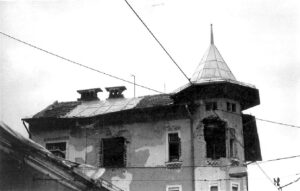Dan's Drivel
Dan… a guy who likes to write | Drivel… nonsense | Dan’s Drivel… what readers will come across while perusing this site… enjoy –
Bosnia: After the War
(Photos and poetry)
by Dan Franch
In September, 1996, two months after completing my service as a Peace Corps volunteer in Morocco, I worked as an electoral supervisor for national elections in Bosnia. During that time, I was able to see and hear sights and stories that the people of my generation have been fortunate to avoid experiencing — the effects of a long, drawn-out war.
In 1994, Bosnia was in its second year of what would become a four year tragedy. At the time, a kg. of flour (2.2 lbs) was selling for $22 at the store. A loaf of bread cost $15. Families were rationing food. A piece of bread and some vegetables were one day’s meal. Students in villages outside the city walked 4 to 5 miles to school, the overcrowded bus making only one trip each day.
These were tales I remember my mother and father telling about life during the Second World War. However, I had to keep reminding myself that the hardships I was now listening to took place within this decade.
I remember walking along the city streets of Mostar, down a particularly ravaged row of buildings that seemed to be writhing in pain. I laughed. It was either that or cry. Shaking my head, I wondered aloud, “How many bullets, grenades and mortar rounds into a building’s façade does it take before the trigger finger, hand and mind say enough.”
I
Bosnia’s landscape is much like the bottom of the ocean, the ocean is blue sky.
Little towns so far apart, a ribbon of road as thin as dental floss flows between, rippling up & down its ridges as craggy as crooked gums.
Buildings, houses and shops hollowed out by artillery fire lay like shells on a desolate beach.
The scene similar to a coastline after a tempest, structures clinging to hillsides and valleys like shipwrecks undersea.

SARAJEVO – one wing of the library, which was severely damaged in the war.
TUZLA REGION – a typical home in the countryside.
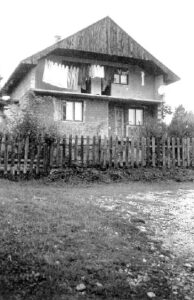
II
Hey you, (or me if I’m talking to myself) pointing fingers; guns; blame
“hey nigger.
“hey spic.
“hey jew.
“hey dothead.
“hey arab.
“hey cracker.
skeletons have no race or creed when piled
side by side they’re nothing but a sack of bones

SARAJEVO – the remains of a heavily-shelled building in the modern part of the city.
III
I saw an old man rocking back and forth on a balcony whose back wall
was decorated with the dance steps to the bullet tango scattered all around him
I wondered as I watched
did he take his seat after the song had ended or was he still there from before the loud music had begun to play
– and missed
SARAJEVO – a lone minaret looks don upon a line of bombarded buildings near the main square.
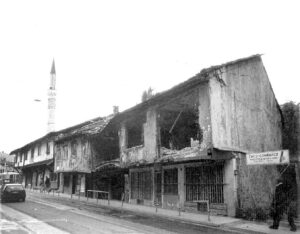
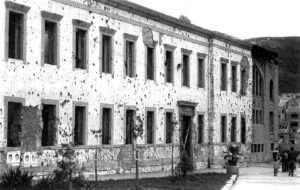
MOSTAR – the pockmarked facade of a building near the river.
IV
“They (bullet marks) cover the
buildings like termite holes.”
– Thomas Curley
like termites,
poking out crawling back in scurrying about in different directions through cavernous holes bored out by iron tentacles probing for something on the outside to eat
TUZLA – a monument marking the spot where 71 students were killed by a hand grenade in the center of the city.
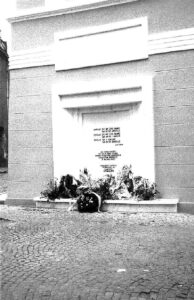
V
I sat with an old, old woman today We were talking about the war
Her face grew older (as she dabbed tears from her eyes)
I didn’t think that was possible

MOSTAR – looking down river from what remains of the 16th century bridge.
VI
Her body aerated by bullet holes
repetition bleeds through pockmarks inside her crumpled frame
fragments from the window to her soul scattered all around
like a dead tree log yet more dignified
echoes screaming:
‘not again’
MOSTAR – the remains of a 16th century bridge that was destroyed by enemy fire.

VII
From 2 to 6 I was in a war neither enemy nor ally
I was just a target
not good guy
not bad guy
yet,
generally understood
part of the problem
Even now in high school though my memory eludes me while learning about the aftermath in school
I still
jump beneath my desk from hearing loud noises like the backfire of a car and ask myself why?

SARAJEVO – a tram car stops at the center of town.
VIII
Minarets and steeples spiral high climbing toward much loftier aim
shaped like slender missiles
looking down upon random targets leading toward senseless decay
SARAJEVO – a grenade imprint on the sidewalk alongside the river.

IX
Buildings Stand erect in proud posture Side by side, Facing one another A corridor for mere mortals To pass and glance in awe
Bullet holes; Broken glass; Bombed innards
Reflect upon and mimic Facades that Refuse to look away
X
believe it or not the tram car is already up and running
in a one-way loop around the city
just as it did before the war –
moving in and out of shadows cast by the Olympic Stadium
still standing since ‘84, then down along the river’s edge reflecting buildings grim with
the burden of being proud, past the bridge where the archduke and his wife were assassinated
sparking World War I, before letting off passengers eager to return to life as they remember, prior
to the war, and
once again
like a skater who has fallen twice yet continues her routine
there is life in this cultural city,
yes, there is life in Sarajevo.
XI
One day when the steeple’s fall and the minarets all disappear one day when the castles crumble and the palaces are all wiped clear …one day
one day when the guns are all recalled and nuclear warheads are all demolished one day when the dictators are silenced and generals and warlords are all abolished …one day
one day when power is no longer desired and isms are all erased one day when utopia is seen for what it is and other such errant notions are all replaced one day …one day
One day…
One day…
One day… when?
XII
look
At me, at
what you have done
You,
who extracted me from a mountainside
You,
who plucked me from a riverbed You, who shaped me and formed me You, who fashioned me as you saw fit then turned me out
a shell of what I used to be
look
At me, at
What I have become.
I
am the displaced I
am the diaspora I
am an asylum seeker I
am a refugee wanting to return to a river that no longer runs red a mountain that does not hide mines.
Look
At me.
XIII
one grenade and 72 kids’ lives one grenade and 72 pairs of eyes the grenade gets launched, the lives get lost the grenade explodes and nobody knows what their lives and eyes might hold
XIV
the footprint landed –
not a thud or rattle or clicking of heels
more like on tiptoes
Then one
Loud,
Unexpected,
BOOM
Everybody scattered, or rather,
It scattered everybody
…shrapnel fell all around
XV
grounded by disaster yet still able to sing its song, the bird nurses its broken wing sure that soon it will again be able to fly

MOSTAR – the exterior of a building that was hollowed out by bombs and mortar fire.
TUZLA REGION – voting booths at one of several polling stations in the region.
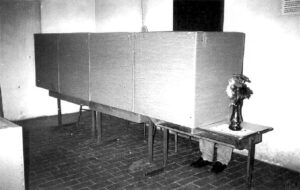

TUZLA REGION – grounds surrounding one of the polling stations in the area.
MOSTAR – a row of ravaged buildings near the river.


SARAJEVO – a minaret looks down upon the effects of the shelling.
SARAJEVO – A building rendered uninhabitable due to the war.
